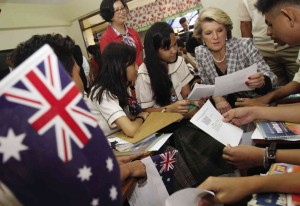The ‘best’ for Filipino students

GIFTS FROM DOWN UNDER Australian Foreign Minister Julie Bishop sits down with BEST beneficiaries at NeptaliGonzales High School in Mandaluyong City
For 12-year-old Joemayleen Naquita, waking up for school on a February day was as exciting as rising on Christmas morning.
That day, she and millions of other students across the Philippines received a gift she called “unpayable”: AUD$150 million or P6 billion in education assistance from the Australian government.
It was the latest grant to the Philippine education sector, making Australia the country’s “most valuable partner” in education reform, said Education Secretary Armin Luistro.
Naquita said that every morning now, she would wake up knowing there was a chair for her in their classroom.
“We know that, come rain or sunshine, our classes will not be disrupted. Our boards will be filled with life lessons, knowledge and information that will make us the fine people we are about to become. You gave us hope and for that, we say thank you,” she said, speaking on behalf of her peers at the recent launch of the new initiative at Neptali Gonzales High School in Mandaluyong City.
Article continues after this advertisementThe sixth-grade honor student who impressed the Australian guests added: “I am sure most of you here know that happy feeling of waking up on Christmas morning because gifts are waiting to be opened. That happy feeling is exactly what you gave us.”
Article continues after this advertisement8 million students
Australian Foreign Minister Julie Bishop and Ambassador to the Philippines Bill Tweddell, with Philippine education officials, launched the Basic Education Sector Transformation (BEST) program, a six-year program expected to benefit some eight million Filipino students in 19,000 schools. BEST will build new classrooms and laboratories, train teachers and support curriculum development.
Anchored on the Department of Education’s (DepEd) K to 12 (kindergarten to 12 years) program, BEST will focus on the six neediest regions: Metro Manila, Bicol, Northern Mindanao and Western, Central and Eastern Visayas, which were recently struck by an earthquake and Supertyphoon “Yolanda.”
“Australia and the Philippines are close friends and neighbors … Over many decades, the foundation of our relationship has been our support for the education sector here in the Philippines. I can’t think of a better way to support a friend than with the education of the young people of their country,” Bishop told reporters after the launch.
Under the program, Australia will fund the construction of 1,000 classrooms, of which 500 would replace those totally destroyed by Yolanda, said Bishop.
The number is a third of the 3,000 classrooms that have to be replaced in disaster-ravaged provinces using disaster-resilient designs, Luistro said in an interview.
The private sector is funding the construction of the rest while the DepEd is taking care of repairs of some 13,000 classrooms in the disaster zone using its own funds, he said.
The BEST program will also fund the construction of 40 science and computer laboratories in select schools, plus two indigenous people’s learning centers.
25,000 teachers
It will also support 1,000 teacher scholars and the retraining of some 24,000 public school teachers on the new K to 12 curriculum. School managers, division superintendents, division supervisors, school heads and managers will also undergo organizational development training.
The program also covers K to 12 curriculum development assessments and more research exchanges across universities, such as the partnerships supported by the Australian Agency for International Development between the University of New England and Philippine Normal University’s Research Center for Teacher Quality, a facility run with a P235-million grant, and between the University of Melbourne and the University of the Philippines’ Assessment, Curriculum and Technology Research Center.
“We hope that our support can assist the Philippine government in realizing its dream of K to 12 education for the young people of this magnificent country,” said Bishop, formerly Australia’s education minister.
Australia supports the K to 12 program, which adds two years to the old 10-year basic education cycle to put the country on par with international standards and give students more time to prepare for college or acquire vocational/technical skills for employment after high school.
Bishop told the students who welcomed her in Mandaluyong: “The opportunity to learn and to continue learning throughout your lives… has such an important social and economic
impact for your country. But for you, it is transformational.”
The BEST program also aims to help influence changes in curricula in Philippine universities and colleges to help them become “internationally competitive” in preparation
for the implementation of the New Colombo Plan.
The new plan, a reversal of the original Colombo program that brought Asian students to Australian universities, will put Australian undergraduates in exchange programs in Asia Pacific universities, including the Philippines, beginning in 2015.
Bishop said that under the new plan, “we hope to give young Australians the opportunity to study in universities in the region so that our young people can have the benefit of living among local communities, studying, working, making friends and making connections that will last a lifetime.”
During her two-day visit to Manila, Bishop and the Australian delegation also attended the fourth Philippines-Australia Ministerial Meeting. With Australian Minister for Trade and Investment Andrew Robb and Barry O’Farrell, premier of New South Wales, she met with President Aquino and Filipino trade and foreign affairs officials.
PHOTOS BY JOAN BONDOC
